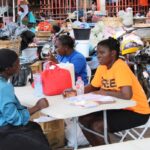Child rights activists have attributed Ghana’s poor Juvenile Justice System (JJS) to lack of active Senior Correctional Centres (SCC) and shelters.
According to them, only one out of the supposed SCCs nationwide is functioning, and this is undermining the country’s Juvenile Justice System.
“The lack of SCCs and Shelter Homes in nine out of 10 of the countrys regions could have a negative impact on the justice delivery system for victims of juvenile delinquency and forced marriages, human trafficking and domestic servitude.”
“Ghana needs to build at least one Senior Correctional Centre and a Shelter Home in each region of the country otherwise the current situation would continue to undermine the countrys Juvenile Justice System.”
“There is only one shelter home available and this is believed to have been inaugurated recently by the Ministry for Gender, Children and Social Protection.”
They said the situation is dire in the three regions of the north where forced marriages, child trafficking, and domestic or sexual servitude among others are widespread.
“Children rescued from traffickers in other parts of the country are sometimes sent to live in private ‘shelters’ which should not be the case.”
They raised this concern at a day’s consultative forum on justice for children organized by the Legal Resources Centre (LRC) and funded by the European Union (EU) at Sagnarigu in the Northern Region.
They lamented that “even the mode of the arrest of juveniles by the police, lack of knowledge of juvenile law among adults and children are serious gaps that ought to be addressed.”
The Northern Regional Director of the National Commission for Civic Education (NCCE), Alhaji Abdul Razak Saani bemoaned successive governments’ failure to enforce laws meant to protect the rights of children.
He decried the meager resources allocated to the Departments of Social Welfare and Community Development, Legal Aid Scheme, the NCCE, Commission on Human Rights and Administrative Justice (CHRAJ) among others to carry out their mandate effectively.
A private legal practitioner, Clarke Noyoru contended that Ghana had good laws on child rights protection but proposed the amendment of some of the rules.
There is an issue related to police forms being given to victims of rape or defilement which requires that the victims themselves pay for such medical consultations. That is not right because it means that if the victim is unable to pay for the consultation, she cant be examined in order for the police to determine whether indeed she was raped or defiled.”
“This aspect of the law needs an amendment so that government itself can take up the cost of medical examination of the victims.
The forum sought to build synergies and ensure massive discourse on strategies that would promote an enhanced child justice system within the concept of the justice for children policy and relevant legislation.
It also sought to review existing child justice legislative policy and institutional frameworks, identify gaps in these frameworks and propose amendments to legislation or policy reforms for the promotion and protection of children who are in conflict and contact with the law.
The laws of Ghana do not allow a child below 18 years who have been caught up with the law to be tried in any court of law except a Juvenile Tribunal.
Children should not be kept in adult prisons except in an SCC built to be child-friendly and provides all the needs required for a child to continue with his/her education or engage in some vocational skills training till such a time that he/she is released.
When the Juvenile Tribunal sentences children below 18 years, they have to serve their sentences at the Accra SCC irrespective of which region the person was tried.
Source: https://citinewsroom.com/2018/08/21/senior-correctional-centers-needed-to-improve-juvenile-justice/








